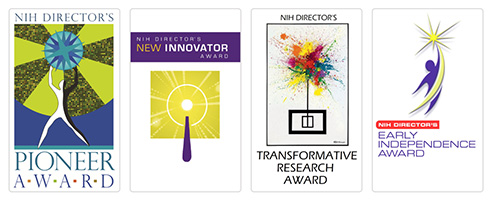NIH Clinical Trials Contacts
The High-Risk, High-Reward Research program welcomes any project relevant to the NIH mission, including clinical trials. Though technical and conceptual risks are expected in highly innovative projects, clinical research must also contend with potential risks to human subjects. Because awards are administered by the most topic-relevant NIH Institute or Center (IC), applicants proposing NIH-defined clinical trials should contact program staff at the appropriate IC to ensure their applications conform to NIH and IC-specific policies for clinical trials.
| IC | Specific Instructions | Contact |
|---|---|---|
| NCATS | The National Center for Advancing Translational Sciences (NCATS) strives to develop innovations in order to reduce, remove or bypass costly and time-consuming bottlenecks in the translational research pipeline to speed the delivery of new drugs, diagnostics and medical devices to patients. Translational science is the field of investigation focused on understanding the scientific and operational principles underlying each step of the translational process. Translating biomedical discoveries into clinical applications is essential to improving human health. It is also a complex process with high costs and substantial failure rates. NCATS is interested in supporting clinical trials that aim to improve this translational process. Some examples of research that could be supported through this FOA include but are not limited to
| Josh Fessel, MD, PhD, ATSF Email: [email protected] |
| NCCIH | Contact by research area | |
| NCI | Lori Henderson, PhD Phone: (240) 276-5930 Email: [email protected] | |
| NEI | NEI will not support clinical trials that are greater than minimal risk on this funding opportunity (Minimal risk is defined as the probability and magnitude of harm or discomfort anticipated in the research are not greater in and of themselves than those ordinarily encountered in daily life or during the performance of routine physical or psychological examinations or tests). | Donald Everett, MA Phone: (301) 451-2020 Email: [email protected] |
| NHGRI | Simona Volpi, PharmD, PhD Phone: (301) 480-3480 Email: [email protected] | |
| NHLBI | Katherine Kavounis Phone: (301) 594-1369 Email: [email protected] | |
| NIA |
| Contact the NIA Office of Clinical Research |
| NIAAA | Policies and guidance established by the US Food and Drug Administration (FDA), NIH, and NIAAA should be reviewed by researchers prior to applying for support or initiating studies involving human subjects research or clinical trials. See NIAAA Human Subjects Research and Clinical Trials webpage for more information on NIAAA Clinical Trial policies. | Megan Ryan, MBA Email: [email protected] |
| NIAID | Maria Powell, PhD Email: [email protected] | |
| NIAMS | Contact by research area | |
| NICHD | NICHD Policies on Clinical Research and Related Issues | Andrea Horvath Marques, MD, MPH, PhD Email: [email protected] |
| NIDA | The mission of the National Institute on Drug Abuse (NIDA) is to advance science on the causes and consequences of substance use and substance use disorders (SUD) and to apply that knowledge to improve individual and public health. In this regard, NIDA addresses the most fundamental and essential questions about substance use and SUD — from detecting and responding to emerging trends and understanding how substances work in the brain and body, to developing and testing new approaches to treatment and prevention. NIDA is interested in supporting mechanistic clinical trials* and Basic Experimental Studies with Humans (BESH) that aim to aid these processes through this FOA. Some examples of research include but are not limited to:
*A mechanistic clinical trial is designed to understand a biological or behavioral process, the pathophysiology of a disease, biomarkers for a disease or response to treatment, or the mechanism of action of an intervention. It is not designed to test the safety or demonstrate the efficacy/effectiveness of an intervention. | Katia Howlett, PhD, MPP, MBA Roger Little, Phd |
| NIDCD | The NIDCD Clinical Trials webpage contains information on NIDCD clinical trials policies, requirements, and guidance. | Trinh Ly, MD Phone: (301) 435-4085 Email: [email protected] |
| NIDCR | Dena Fischer, DDS, MSD, MS Email: [email protected] | |
| NIDDK | NIDDK accepts applications for low risk clinical trials in its mission. Please see NOT-DK-21-004 for further information. | Barbara Linder, MD, PhD Phone: (301) 594-0021 Email: [email protected] |
| NIEHS | For help with human subjects/clinical trials issues, please contact Michelle Campbell. | Michelle Campbell, MB Phone: (984) 287-3972 Email: [email protected] |
| NIGMS | NIGMS supports basic biomedical research that contributes to the understanding of fundamental cellular and physiological principles. General areas of interest include cell biology, biophysics, genetics, developmental biology, pharmacology, physiology, biological chemistry, biomedical technology, bioinformatics and computational biology. The Institute also supports research in certain clinical areas, primarily those that affect multiple organ systems. Additional information is available on the NIGMS website about research interests (including staff contact information) and clinical studies and trials. | Della White, PhD Email: [email protected] |
| NIMH | NOT-MH-19-006: NIMH Acceptance of Clinical Trial Applications under the Parent R01 and R21 Clinical Trial Required, or Basic Experimental Studies Involving Humans (BESH) Announcements is Limited to Mechanistic Clinical Trials | Contact by research area |
| NIMHD | Lynne Padgett, PhD Phone: (301) 827-5511 Email: [email protected] | |
| NINDS | Applicants must reach out to their potential NINDS PO first. If questions remain, the PO will then contact NINDS ITACT. |



